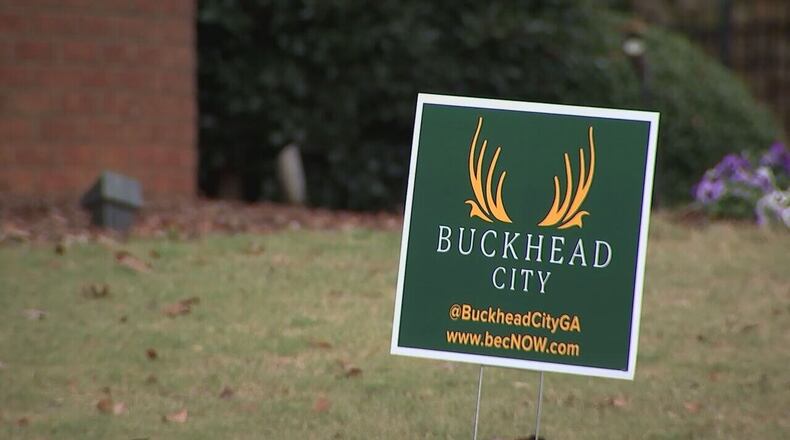It’s never a good sign when the sponsors of a bill at the General Assembly don’t want to talk about it. But that’s exactly what happened this week when a group of Republican senators, all from outside of Atlanta, introduced another bill this week to carve the Buckhead neighborhood out of Atlanta.
The movement behind it has always been more smoke and mirrors than genuine problem-solving. And Senate Bill 114, the new version of the legislation to make it happen, seems to be more of the same.
The cityhood effort in the tony neighborhood gained steam suddenly in 2020, and for good reason. Like all areas of Atlanta, violent crime spiked and then-Mayor Keisha Lance Bottoms seemed to be disengaged from dealing with it.
If Buckhead didn’t have a mayor that wanted to address its problems, the thinking went then, they could get their own mayor.
But the tiniest kick on the tires of the legislation to move the “City of Buckhead City” to a referendum last year revealed the gaping holes it would have created.
Where would Buckhead kids go to school, since they wouldn’t be eligible to attend their current Atlanta public schools? What would happen to the Buckhead parks, which Atlanta would still own? What would happen to bond ratings for Georgia cities if the wealthiest residents could suddenly vote to leave?
And how would crime change in Buckhead if the suspects arrested there would go to the same prosecutors and judges at the Fulton County Superior Courthouse, where all violent crime in the county is dealt with?
The new Buckhead legislation includes all of the same unanswered questions, with a few truly eye-popping new details that need explanation.
Among them is the potential mayor’s salary, mandated at a whopping $225,000 per year in the legislation. That would make him or her the highest-paid elected official in the state, earning more than Gov. Brian Kemp.
The new bill also gives the potential mayor and city council the power to tax Buckhead residents, including on behalf of the Atlanta Public Schools. Why would they tax APS when the new Buckhead City children would still be ineligible to attend APS schools?
Also new — a provision that would prevent any current elected official from becoming that high-priced mayor, a tweak that would preclude anyone in the Legislature or the Atlanta City Council.
With so much new in the bill, I went to the bill’s lead sponsor, state Sen. Randy Robertson to ask about the changes.
The retired Muscogee County sheriff from Cataula, Ga. told me he was very busy Wednesday, so would not be able to answer questions. Instead, he referred me to the Senate Press office for comment, which sent a written statement from Robertson about the need for a Buckhead vote, but no comment on the bill itself.
When I caught up with Robertson again Thursday to ask about the mayor’s salary, he scooted quickly into the Senate chamber. “I’ll see you at the hearing!” he said.
There’s no hearing scheduled yet.
State Sen. Brandon Beach, a GOP co-sponsor from Alpharetta, sent me back to Robertson for the salary question, as did state Sen. Greg Dolezal, a Cumming Republican. The lobbyist for the cityhood group, John Garst, told me nobody’s talking, including him.
Even compulsive chatterbox Bill White, the face and very loud voice behind the Buckhead City Committee, said he’ll have nothing to say beyond a written statement declaring the committee “elated” that the bill has been introduced again.
All of this would be funny if it weren’t also serious. A bill pushing to open the future of Atlanta up to a ballot initiative ought to be transparent for the people who live there now — both inside Buckhead and outside of it.
State Sen. Sonya Halpern, one of the three state senators who represent portions of Buckhead and all oppose the split, said the new bill, just like the old bill, would create more problems than it would solve.
“It continues to ignore the fact that schools are jeopardized,” the Atlanta Democrat said. “The bonding questions are still open. What happens to city-owned parks? What happens to infrastructure? Fire stations? Police stations? All things the city would still own, none of that is addressed.”
Newly elected state Sen. Jason Esteves, another Democrat who represents Buckhead, was the chairman of the APS board last year. He said that the pro-Buckhead group never talked to APS then about the future of the schools, even as it wrongly promised Buckhead voters their children could go back to their current schools.
“The kids and families would be left in the lurch,” he said of the new bill and Buckhead children currently at APS schools.
He also called the unusually high salaries for elected leaders in the new bill “outrageous” and said the argument to vote to move cityhood to a voter referendum is flawed.
“If you have a small percentage of people who want something to get through that’s thrown to a referendum, that’s called California,” he said. “This stuff is not what the majority of people want in Buckhead or in the City of Atlanta.”
The best theory behind the deafening silence on Buckhead City from this year’s sponsors is the fact that last year’s effort blew up spectacularly after White’s full-court, and frequently offensive, press on Fox News, Twitter, and the comments section of Instagram.
Silence, this year, even on fundamental issues of the potential future city, seems to be the safest approach for now.
The questions surrounding the feasibility of the “City of Buckhead City” haven’t been enough to stop this train so far. But state Sen. John McLaurin, the third opposing state senator from Buckhead, said the one reality that could stop Republicans is the new Democratic city they’d surely be creating. The precincts in Buckhead voted 60% for Joe Biden in 2020.
“I suspect that, in addition to explaining the nuts and bolts of why’s the idea of cityhood simply won’t work, the fact that Democrats would control basically everything about the city is probably sufficient political cover (for Republicans to oppose it,)” he said.
If that’s the case, the bill’s sponsors aren’t saying it, or anything else for that matter.
About the Author
Keep Reading
The Latest
Featured




